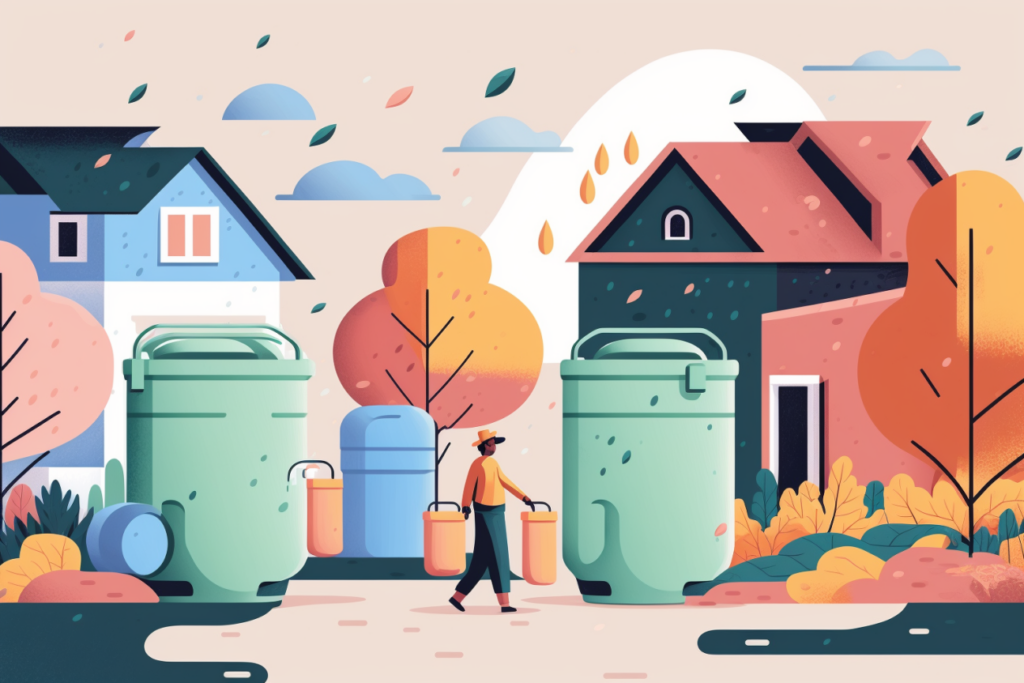Harvesting rain is a practice that’s becoming more and more popular in the United States. And no wonder! It’s a smart way to conserve water, save money and reduce stormwater runoff.
Once the water is collected, it can be stored and repurposed for household chores, irrigation of your property and sometimes even drinking (when properly filtered).
But is it legal to collect rainwater where you live? Here’s what you need to know before you start harvesting precipitation on your property.
Is it Illegal to Collect Rainwater in the United States?
As of 2023, there are no federal laws that prevent the collection of rainwater. Instead, the federal government leaves it up to the individual states to decide the matter. The good news is that in most parts of the US, rainwater collection is still unregulated.
The even better news is that some states (like Arizona, Texas and North Carolina) take a more progressive approach and even encourage and incentivize the collection of rainwater.
So are there any states where the practice is restricted? Yes. Colorado and Utah have the strictest laws and limits when it comes to rainwater collection, but there are also other states that regulate the practice to varying degrees.
These restrictions can include things like limiting the amount of water you can collect, requiring a licensed plumber to set up a collection system, limiting the collection to your rooftop only, and the prohibition of using rainwater for potable purposes.
We’re going to follow up with a complete list of all 50 states, but be aware that laws surrounding rainwater collection do change. So before you decide to start harvesting rainwater on your property, it’s best to check in with your state legislature first.
Why Is Rainwater Collection Restricted in Some States?

So why would the collection of rainwater be restricted at all? There are a few reasons why some states decide to limit the practice.
Concerns About Purity
Because rainwater is usually collected on your rooftop or in an open barrel, it can contain animal feces or other contaminants that could make it dangerous to consume if it’s not filtered properly.
That’s why some states limit collected rainwater to non-potable use only.
Prior Appropriation Laws
In the Old West, prior appropriation laws were set up to protect the water rights of settlers in a first-come, first-serve approach. In the more arid western part of the US, you can probably understand why these laws were first set up.
Although this kind of thinking is now outdated when it comes to modern-day living, these restrictions are still in place in some states. The basic idea is that collecting rainwater on your own property could prevent it from flowing onto someone else’s land.
While some states are in the process of updating these laws, they do still exist in some places.
The Hydrological Cycle
When precipitation soaks into the earth, it replenishes groundwater and is part of the planet’s natural hydrological cycle. According to one way of thinking, excessive rainwater collection could disrupt the amount of water that seeps back into the soil.
Although a study by the Scientific Journal showed that the collection of precipitation by individual homeowners would have little to no effect on the hydrological cycle, some states have decided to limit the amount of rainwater you can collect.
Rainwater Laws State by State
As we mentioned, rainwater laws are always in flux, so be sure to check in with your state government before you set up a collection system. That being said, we’re going to start with the list of states where the collection of precipitation is unregulated to date.
33 States Where the Collection of Rainwater is Unregulated
As of 2023, this is the list of states where rainwater collection is unregulated and, in some cases, incentivized by the government.
- Alabama
- Alaska
- Arizona (offers incentives)
- Connecticut
- Delaware
- Florida (offers incentives)
- Hawaii (offers incentives)
- Idaho
- Indiana
- Iowa
- Kentucky
- Louisiana
- Maine
- Maryland (offers incentives)
- Massachusetts
- Michigan (offers incentives)
- Minnesota (offers incentives)
- Mississippi
- Missouri
- Montana
- Nebraska
- New Hampshire
- New Jersey (offers incentives)
- New Mexico (offers incentives)
- New York
- Oklahoma
- Pennsylvania (offers incentives)
- South Carolina
- South Dakota
- Tennessee
- Vermont
- West Virginia
- Wyoming (offers incentives)
17 States Where Rainwater Collection Is Regulated
As of 2023, the following states regulate the collection and use of rainwater to varying degrees. That being said, some of these states still do incentivize the practice. Let’s take a look state by state. Note: These are general guidelines. Please consult your state legislature for the complete list of restrictions.
Arkansas
The state of Arkansas limits collected rainwater to non-potable uses only.
California
Although it was illegal before, a 2012 law made the collection of rainwater legal in California. You won’t need a permit to collect it with rain barrels on your roof, but if you want to set up an official collection or irrigation system, you may need a permit.
Colorado
Colorado is one of the most stringent states when it comes to rainwater collection and limits you to two rooftop barrels with a combined capacity of 110 gallons. The collected water can also only be used for outdoor, non-potable purposes on the property where it was collected.
Georgia
The state of Georgia limits collected rainwater to non-potable uses only.
Illinois
While rainwater collection in Illinois is legal, the practice is limited due to concerns about water quality and availability.
Kansas
Kansas requires a permit for rainwater collection if used for anything other than domestic purposes and does not consider it a viable source of drinking water.
Nevada
Some of the restrictions of rainwater collection in Nevada include that it can only be collected from the rooftop of single-family dwellings, be used for non-potable purposes and not conflict with existing water rights.
North Carolina
Although the collection of rainwater is incentivized in North Carolina, it does have to be done according to certain laws and guidelines.
North Dakota
The collection of rainwater is encouraged for domestic use in North Dakota, but if it’s intended for the irrigation of more than five acres or for industrial purposes, a permit is required.
Ohio
Although the collection of rainwater is legal even for potable use in Ohio, there are some regulations.
Oregon
Rain harvesting is legal and incentivized in Oregon but can only be collected from rooftop surfaces and is not considered appropriate for potable use. Rainwater that falls to the ground cannot be collected.
Rhode Island
Rhode Island also offers incentives for the collection of rainwater, but precipitation can only be collected on rooftop surfaces and with approved materials.
Texas
The state of Texas offers tax incentives for the harvesting of rainwater, but the catchment system must be incorporated into the design of the building, and rainwater used for potable purposes must be treated.
In addition, Texas also requires some state facilities to incorporate a rainwater collection system into their design. In other words, Texas is a forward-thinking state when it comes to harvesting rainwater!
Utah
In Utah, rainwater collection is limited to 2500 gallons if you’re registered with the Division of Water Resources and to two 100-gallon containers if you’re not registered.
Virginia
In Virginia, rainwater collection is limited to outdoor and non-potable use only. However, there is a tax credit for citizens who install a rainwater harvesting system.
Washington
You won’t need a permit to collect rainwater in Washington as long as it’s collected from an existing rooftop and is used on the property where it was collected.
Wisconsin
Harvesting rainwater is legal in Wisconsin for outdoor, non-potable use only. Wisconsin does also offer some incentives as well.
The Benefits of Collecting Rainwater
Now that you have a better idea of how the collection of rainwater is regulated in your state, let’s go over some of its benefits.
Conserves Ground Water
In a time when groundwater is being increasingly strained by population growth, drought and pollution, the use of precipitation is a smart way to conserve our precious supplies of it.
Reduces Dependence on Municipal Water and Costs
Collecting and using rainwater for household chores and landscaping reduces your dependence on municipal water and also lowers your water bill.
Saves Energy
The treatment and pumping of municipal water require a lot of energy. That’s why the use of rainwater also helps to reduce the use of energy.
Helps to Reduce Stormwater Runoff
Collecting rainwater can help reduce the amount of stormwater runoff on your property, which in turn reduces the contamination of surface water with fertilizers, pesticides and sediment.
Rainwater Is Healthy for Plants
Because rainwater contains no chlorine or fluoride, it’s a very healthy way to irrigate your plants and yard.
Rainwater Can Be Used in Everyday Chores
Rainwater can be used in place of municipal water for everyday chores like watering the yard, bathing pets, washing your car, washing dishes and clothes, bathing, watering indoor plants, refilling your fish pond or fountain, and flushing the toilet.
And because rainwater is soft, it reduces the need for detergent when washing clothes or dishes.
Rainwater May Reduce the Life of Your Appliances
Because rainwater is soft and free of salts and minerals, it reduces the buildup of scale in your appliances and could help them to last longer.
Rainwater Can Be Used for Drinking
When properly filtered and disinfected, precipitation can be an excellent source of drinking water and has fewer chemicals than municipal water.
Rainwater Can Help in Times of Emergency
While rainwater can be a sustainable primary source of water, it can also be stored and used in times of emergency.
Is There Rainwater in Your Future?
As the world population continues to grow, the demand for water and the strain on our groundwater supplies is higher than ever. That’s why new conservation and water supply methods are so vital to our future.
Although rainwater harvesting is relatively new in the United States, it’s a simple and sustainable method to decrease our demand for municipal water and conserve groundwater supplies.
While the collection of precipitation and its uses are regulated in some states, many states have no restrictions and even offer incentives for installing a rainwater collection system in your home.
Of course, before you decide to do so, it’s important to check with your state legislature to understand how the use of rainwater is regulated in your area. Some states impose limits on how much rainwater you can collect and how you can use it.
That being said, rainwater harvesting is a relatively simple and easy way to green your home, save money and help to conserve groundwater. In other words, installing a collection system in your home could make you look forward to those rain clouds!
You might also be interested in: 7 Stunning Outdoor Fireplaces To Transform Your Summer Evenings




